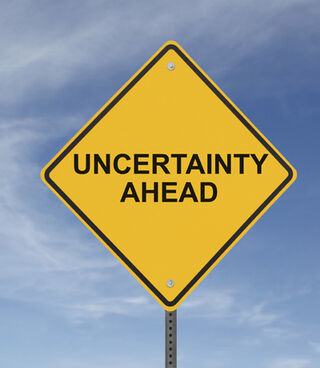Identity
The Gift of Uncertainty
Young people are questioning religious certainty and embracing fluidity.
Posted November 20, 2021 Reviewed by Abigail Fagan
Key points
- American culture identifies with certainty; it is often used as a metric of value.
- A new report shows that young people are facing notable uncertainties, such as how their values align with those of religious institutions.
- Research on identity development has shown the value and necessity of uncertainty in order to form a clear and secure sense of identity.
The United States has a culture that identifies strongly with certainty. To be certain is to have power and control. With the rise of scientific empiricism, certainty was imbued with social, economic, and political power and became part of the American identity—who we are. Certainty is used as a metric of value, shaping how we view ourselves and others. We respect those who present themselves as certain while viewing those who express uncertainty as wishy-washy, untrustworthy, and, ultimately, inferior.

But the reality is that certainty is transient; it is more a feeling than a fact. Still, young people grow up immersed in a cultural zeitgeist of certainty. Whether those narratives come from science, religion, or other doctrines, they are told that to be certain is to be secure, right, and good. More than uncertainty itself, it is the idea that we ought to be certain that rouses such angst.
Springtide’s recent report, The State of Religion and Young People: Navigating Uncertainty, reveals that young people are indeed facing the turmoil of unprecedented uncertainties. In the face of the COVID-19 pandemic, teens and young adults are confronting major disruptions in schooling, housing, employment, relationships, and religious practices. These shifts coincide with rising rates of anxiety and depression, social isolation and loneliness, which urgently call us to connect with, listen to, and support young people with intentionality (Springtide, 2021). At the same time, the Springtide report allows us to hear how young people are questioning certainty and increasingly rejecting the regulations that isolate them from themselves and one another. This shift draws attention to possibility and an opportunity to reimagine more inclusive religious institutions and identities.
Questioning Certainty
Though certainty often masquerades as objective truth, certainty is not neutral. Certainties, religious or otherwise, are not merely held as individual beliefs but as social systems and structures that are often used to regulate, devalue, marginalize, exclude, and ultimately harm those who fall outside of, or dare to question, the boundaries. And yet young people are questioning certain lines and finding ways to live more comfortably and freely in the borderlands. For example, young people perceive a notable gap between their own values and those of religious institutions. Specifically, young people believe that they care significantly more about LQBTQA+ rights, gender equity, immigration rights, racial justice, disability and reproductive rights than religious organizations do. And critically, the values young people care most about are not just issues in the world but the very identities they embody: gender, sexuality, and who they love; race, ethnicity, and racial justice; safety and autonomy of their bodies. In response, young people are seeking (and creating) spaces where their full selves are seen and welcomed.
Elsa, an 18-year-old, interviewed in the Springtide report, illustrates how young people know authenticity and see beyond the guise of certainty:
"Everyone is just trying to live their lives to show a certain face out to the world, not who they truly are or their personality. They can be battling a million different things and nobody will know, and they don’t want to show anyone because they want to keep a certain persona up to the entire world” (Springtide Institute, 2021, p. 20, emphasis added).

Rather than certainty from religious communities and institutions; young people want honesty, authenticity, and inclusion. Milly, a 25-year-old quoted in the Springtide Institute report, described their experience in a space where religious curiosity was embraced rather than criticized:
"Like, struggling with the idea of even believing in God and knowing what or what not to believe. . . . That’s something we talked about in these groups. It actually made me feel a little bit better. It’s like, oh, like we can have doubts. We can struggle with these feelings and they’re still, we’re still valid, you know? So that was actually kind of refreshing” (Springtide, 2021, p. 46, emphasis added).
Young people are not rejecting religion per se, but they are not accepting prepackaged answers or one-dimensional solutions. They are reexamining pre-drawn labels, beliefs, and identities and daring to ask “Why?” These young people do not assert what “it” is, but they are comfortable claiming, “not this.” Eve Tuck, professor, educator, and activist, writes about the power of such refusal in the face of oppression: “[R]efusal is a generative stance, not just a ‘no,’ but a starting place...” (Tuck and Yang, 2014, p. 812). Indeed, the rise in young people reporting identifications of “not religious” and “just Christian” to describe their religious identities carry a similar thread of refusal; this "no" is not a dead end but an invitation to imagine what those identities could be.
The Gift of Uncertainty
Decades of research on identity development has shown the value and necessity of uncertainty in order to form a clear and secure sense of identity. Moratorium is the stage of uncertainty in identity development, a period characterized by exploration, questioning, (re)consideration (Erikson, 1968; Marcia, 1966). The prevalence of uncertainty during the formative years of 13-25, is not new but the Springtide report suggests that young people are embracing the uncertainty; rather than fear, judgment, and rejection, they are practicing ways to accept and trust in the midst of it. Like Ananya, a 22-year-old, who described her confidence in the face of anxieties and uncertainty:
"When I go to an event or meet someone I don’t know, I feel very overwhelmed, but then, I’ve just go to remind myself that it’s okay to feel overwhelmed. It’s not a big deal and it will be okay” (Springtide, 2021, p. 41).
While the experience of being in moratorium is often marked by angst and confusion, it is its contrast with a culture of certainty that bestows such angst to this experience of uncertainty. For sure, clarity of the self helps us to understand who we are and what we will do in the world (Erikson, 1968; Rogers, 2018), but that “sense” of identity need not be fixed or static, it is not meant to be unchangeable or un-editable. Too often we act as if our identities and certainties are drawn in permanent marker: Thick, clear, definitive, and rigid. But they are not. They are actually drawn with pencil — ready for revision, editing, and change.
Right now, young people are experiencing anxieties and fears in the world's precarious state, but their courage is a reminder to all of the gift of uncertainty and the need for moratorium. Our country is in many ways desperate for a period of moratorium. For too long we have lived with foreclosed identities, beliefs, and systems, prescribed social roles and labels, pre-established stereotypes and systems of inequality. The societal ruptures of the COVID-19 Pandemic and the uprisings for racial justice that defined the summer of 2020 have disrupted our daily lives in many concrete and tangible ways but also the more intangible guise of certainty.
And young people, perhaps more than the rest of us, are taking this moment to pay attention, question, search, and reconsider. Young people are searching for spaces that allow them to question, to cultivate their curiosity and authenticity. It is an invitation to all of us to (re)consider — and rediscover — the gift of uncertainty. We can listen and learn from young people, embracing this opportunity as a moment of critical self-reflection and growth, a time to open our hearts and minds to reimagine who we want to be. If we will accept the gift of uncertainty, we might discover the ways that multiple beliefs, practices, values, identities, and communities can coexist and flourish together.
References
Erikson, E. H. (1968). Identity: Youth and crisis. WW Norton & company.
Marcia, J. E. (1966). Development and validation of ego-identity status. Journal of Personality and Social Psychology, 3(5), 551–558. https://doi.org/10.1037/h0023281
Rogers, L. O. (2018). Who am I, who are we? Erikson and a transactional approach to identity research. Identity, 18(4), 284-294. https://doi.org/10.1080/15283488.2018.1523728
Springtide Research Institute (2021). The state of religion & young people: Navigating uncertainty. Springtide Research Institute.
Tuck, E., & Yang, K. W. (2014). Unbecoming claims: Pedagogies of refusal in qualitative research. Qualitative Inquiry, 20(6), 811-818. https://doi.org/10.1177/1077800414530265




